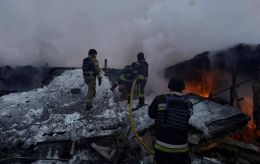'I won't stay where Russians come': How Ukrainian IDPs seek refuge from war in shelters
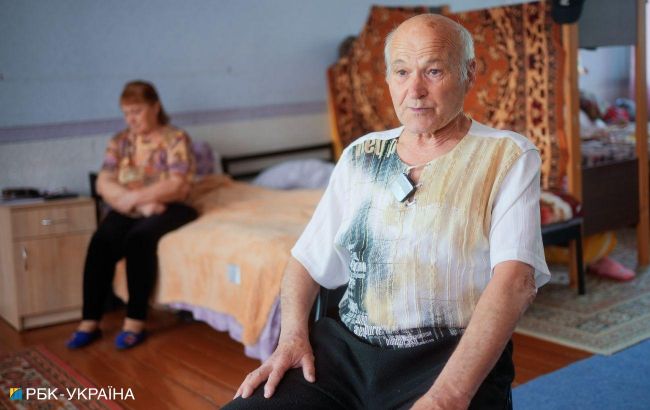 Photo: Mykola Liakh, an IDP from Pokrovsk (RBC-Ukraine/Dmytro Semeniuk)
Photo: Mykola Liakh, an IDP from Pokrovsk (RBC-Ukraine/Dmytro Semeniuk)
There are 3.6 million people in Ukraine who have been forced to change their place of residence since February 2024. Some become IDPs in the second round after trying to return home. Many remain in the frontline area because they have nowhere to go and do not know what awaits them.
Meanwhile, Ukraine has organized shelters - there are currently 1038 temporary accommodation places for IDPs who have come from the areas where hostilities are or have been conducted. According to the Ministry of Reintegration, more than 20,000 places are available in April.
RBC-Ukraine visited one of these shelters in the city of Smila in the Cherkasy region and saw how people who came from the war zone were settling in.
What conditions have been created for IDPs?
The shelter for IDPs in Smila is located in a private kindergarten in the middle of the private sector, accessed by a narrow road past the neighbor's gate. It is a quiet place where only the voices of birds are heard on a weekday.
Two people walk slowly by the typical two-story building with large windows, and in the distance, laundry is drying in a pavilion. Inside, at the entrance to the kindergarten, there are shelves of clothes brought by residents. The corridor smells like stewed potatoes and meat.
A month ago, the institution invited new people to settle here, but in April there were no more vacancies - 16 people who evacuated from Pokrovsk in the Donetsk region arrived, says Natalia Kosenko, the head of the institution.
"People can live here until the end of the war plus 6 months. Since March 1, 2022, 7900 people have passed through the facility. At first, we accepted those who were temporarily moving - for the night, for a day. Then people started to stay for a month, sometimes for a year and a half," says the head of the shelter.
It was planned that the kindergarten would accept 50 children, but now there are 52. Previously, the institution had to accommodate 100 people - on cots, on mattresses on the floor. Now, thanks to IOM, the Red Cross, and NGOs, the shelter has new beds and appliances.
Natalia Kosenko says that the residents are fed twice a day for free - breakfast at 9 a.m. and lunch at noon. The food is provided by the city council, and philanthropists also help. Neighbors bring potatoes and pasta.
The IDPs also do not have to pay for accommodation - the state reimburses the cost of energy. And on September 1, the kindergarten will be transferred to the status of social housing.
Video: How IDPs live in a shelter in Smila (youtube.com/RBC-Ukraine)
A school, a kindergarten, and a hospital are located nearby, which is convenient for IDPs with children.
The premises of 5 groups in the kindergarten have been converted into living rooms, each for 10 people. Families live in 4 rooms, and only one room is occupied by non-family members.
"We have rooms of 100 square meters divided into 50 and 50 meters. There are study areas for children. Each room has showers, toilets, washing machines, multicookers, and microwaves. There is also a shared toilet in the corridor," says the head of the institution about the facilities.
How residents settling in at new place
Now the kindergarten is home to large families, pensioners, people with disabilities, children, and some people with dogs. Previously, the facility had residents with parrots and boas, recalls Natalia Kosenko.
Many of the previous residents have settled in Smila and the district. Some have bought homes, others rent.
"People from Kharkiv stayed for six months and then returned home. Some IDPs went abroad. Some people work - at the plant, in the canteens, and in our institution, they also live and work. People who have recently arrived from Pokrovsk have taken up residence in the hospital," she says.
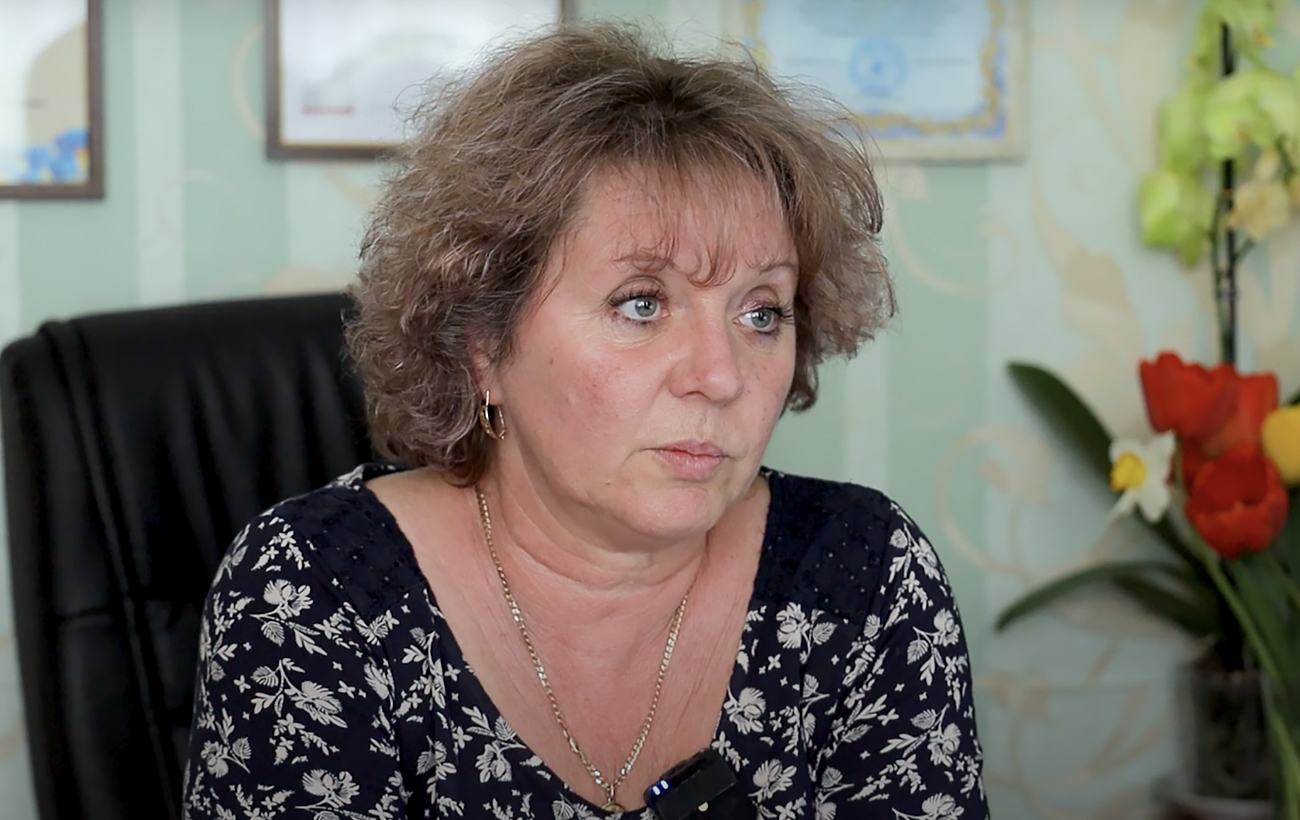 Photo: Natalia Kosenko, head of a kindergarten in Smila (RBC-Ukraine/Dmytro Semeniuk)
Photo: Natalia Kosenko, head of a kindergarten in Smila (RBC-Ukraine/Dmytro Semeniuk)
She says that she remembers the first families from Kharkiv the most, with 12 to 16 people. She leafs through a photo album and shows their photos.
"A child was born here, we baptized him here, and we buried one grandmother. These people always helped us. At Easter, we baked Easter cakes together and sent parcels to the Ukrainian Armed Forces. They are friendly. Now they have found a private house in Smila," says the manager.
The last people the center could accept came from Pokrovsk the other day.
"If someone leaves, we will have space to take people again. But no one is planning to leave," she says.
People from the areas where the fighting is close come in a serious condition because they do not know what awaits them here, says Kosenko.
"Most people have been living at home until the last moment - they are afraid of the unknown. They come here and say we are like a family. For the first two or three days, they go through psychological adaptation. Coming from those places, it is very hard and very sad to look at these people. The first few days, their eyes are full of tears. They say: God help us not to see what they have seen in these parts."
The IDPs quickly return to their usual routine in their new place. The people who arrived a month ago have already cultivated a plot of land on the territory of the kindergarten and sowed vegetables. The refugees who arrived earlier have started keeping chickens.
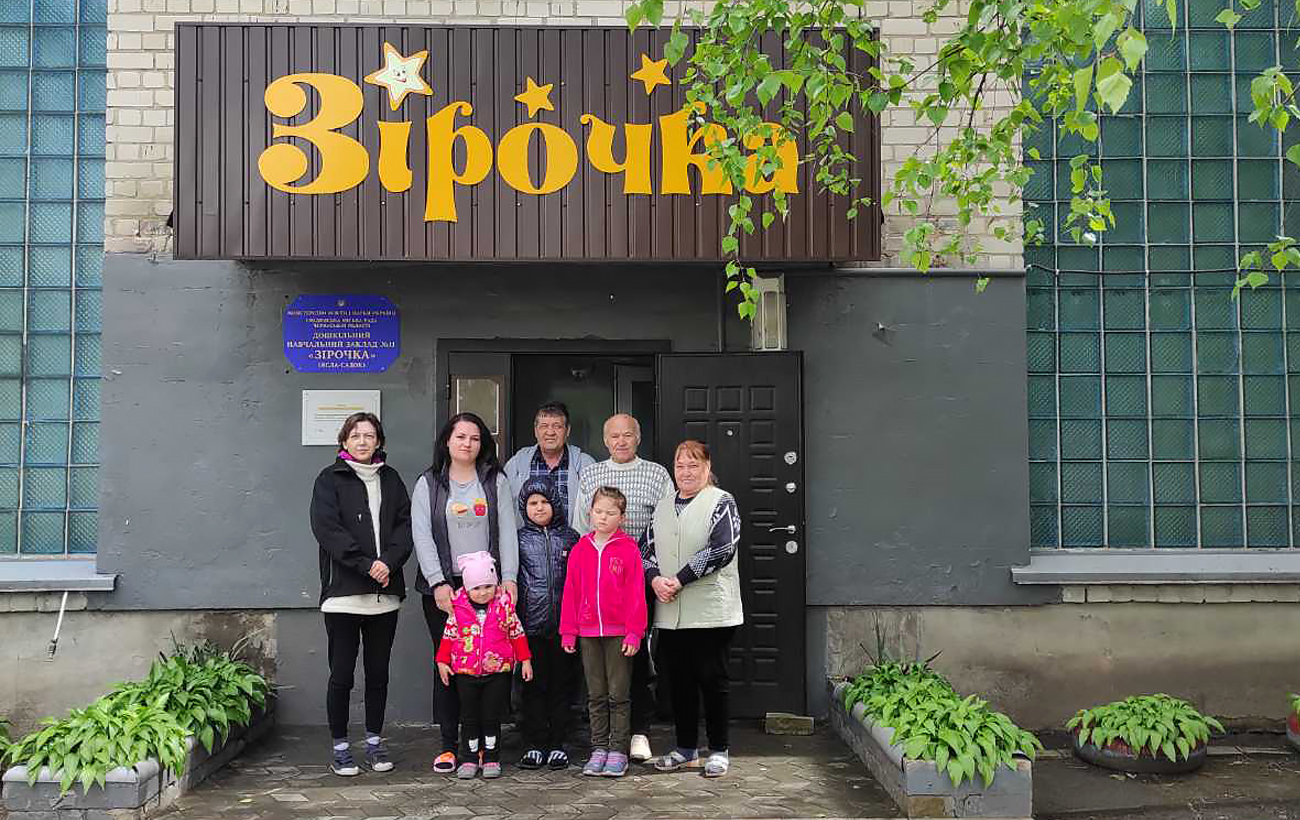 Photo: IDPs in Smila (RBC-Ukraine)
Photo: IDPs in Smila (RBC-Ukraine)
'If it wasn't for my children, I wouldn't have left, I would have endured it'
One of the new residents is Olha Zeinalova from Pokrovsk, Donetsk region. She came to Smila with her two children, aged 2.5 and 8, in March 2024. She says that they left their city twice: at the beginning of the war, they found refuge in Zakarpattia, and in the summer of 2023, they returned home, where her husband remained. The couple owns a cafe in the city.
"We thought it would be quieter. Still, there is shelling, and children are scared. I had to leave again. If it wasn't for my children, I wouldn't have left, I would have endured it. It's very close, everything in the city is broken. My husband stayed in the city, he comes here once a month," she says.
She learned about the shelter in Smila from the Facebook group Typical Pokrovsk. Before that, she called everywhere she could.
"I think there were six regions. Cherkasy is the closest, and in Khmelnytskyi there are villages, and the conditions for children are bad. This was the best fit in terms of conditions. The first time we lived in the West of Ukraine, we also lived in a kindergarten, but we had to go outside to take a shower, and there was only one toilet for 70 people," says Olha.
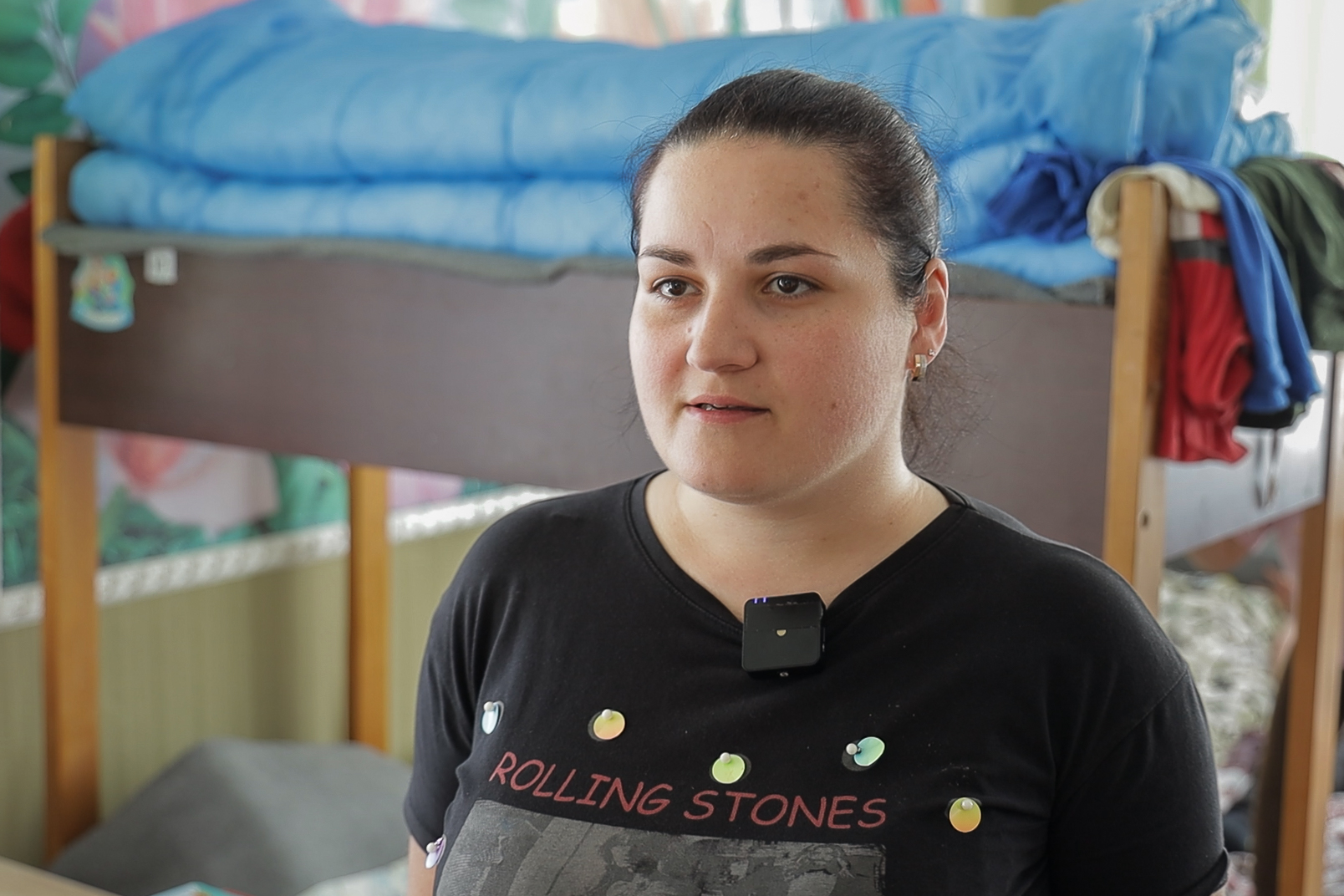 Photo: Olha Zeinalova from Pokrovsk (RBC-Ukraine/Dmytro Semeniuk)
Photo: Olha Zeinalova from Pokrovsk (RBC-Ukraine/Dmytro Semeniuk)
She says she would like to return home if she can, but for now, she is determined to live in Smila.
"Here I just slept the first night. There were sirens, but I didn't react to them, because I knew that everything was normal here, it's calm. There (in Pokrovsk - ed.) is no peace there even without sirens. An airplane is flying - you are afraid. A missile can fly over. After the strike, you just wonder where and what happened. It's especially bad at night when you're sleeping and there's an explosion," Olha recalls.
She says that their houses were shaking from the guided aerial bombs near Avdiivka. If they heard sounds, it meant that the explosions were about 10 kilometers away.
"We already know when we are near or not, we can tell by the sound, the windows open. Then we grab everything, children, documents. And when it sounds like they're not near us, we sit. When there are no strikes for a month, you still live somehow. As soon as one arrives, you walk around, not knowing what to do with yourself. It's so stressful, I'm on edge all the time," she starts crying.
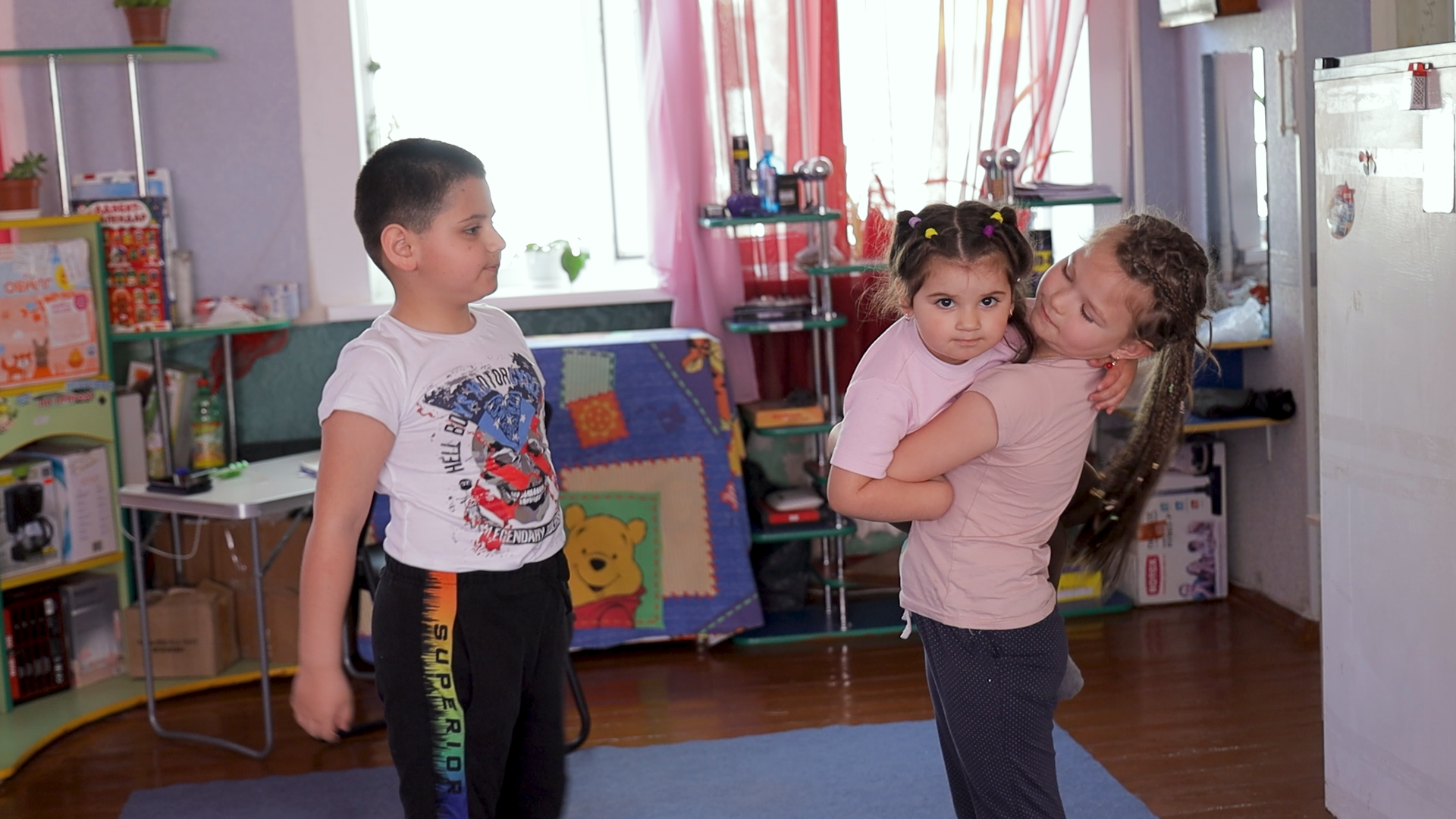 Photo: Children of a family from Pokrovsk (RBC-Ukraine/Dmytro Semeniuk)
Photo: Children of a family from Pokrovsk (RBC-Ukraine/Dmytro Semeniuk)
According to her, there are still many local people in Pokrovsk, including those who came from Avdiivka.
"They do not want to go far away. Some want to return home, even to the occupied territory."
'I won't stay where Russians come'
The eldest in this large family from Pokrovsk is Mykola Liakh, the father of Olha Zeinalova. He was born there and worked at a mine until he retired. A month ago, he left with his wife, two daughters, brother and sister, ex-wife, and two grandchildren. One of the man's sons remained working in Pokrovsk, while the other continued to fight after his third injury.
"The first time we left on March 5, 2022, we were in a village in a kindergarten in Zakarpattia. It's even better here, it's very nice. It feels like we are at home. Because there are more Hungarians there, they speak their language. We have nowhere to go now - they (Russians - ed.) shoot at home. They have already destroyed the kindergarten near us, where my granddaughter went to school. We have a house there. Earlier, when everything was good, we kept pigs, chickens, geese, and ducks, and planted a vegetable garden. We had to leave," the man says.
He adds that he needs to be with everyone because he has a car, which helps the family a lot. From Pokrovsk, he carried a refrigerator, potatoes, clothes, and tools to Smila.
"I want to return only if they (Ukrainian army - ed.) send Russians back. I will not stay where the Russians come. As soon as the war started, I had already prepared gasoline and bottles. I said: I will sit on the second floor and throw it (Molotov cocktails - ed.) when they leave. I don't care anymore. There is no way to live with them - they are animals, they will do anything," says Mykola Liakh.
In 2023, the family returned home to Pokrovsk. They managed to live there for 9 months and had to flee again.
"Our plans are as follows: if the Russians come closer, we need to look for a house here - I see that there are houses for 50-70-100 thousand hryvnias. Then we'll rent a car and bring our belongings, the good things we've acquired throughout our lives. And then live here," he says.
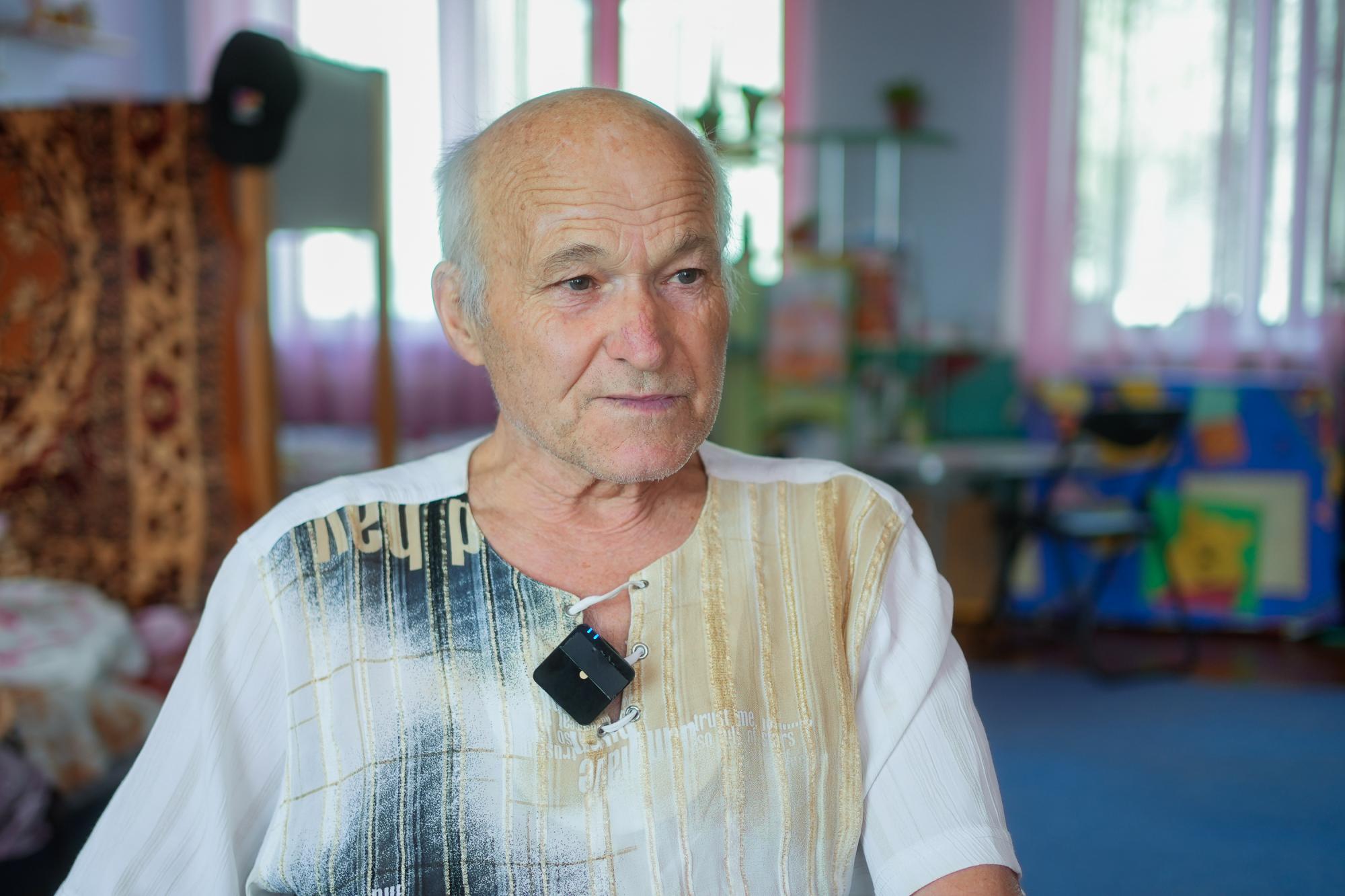 Photo: Mykola Liakh from Pokrovsk (RBC-Ukraine/Dmytro Semeniuk)
Photo: Mykola Liakh from Pokrovsk (RBC-Ukraine/Dmytro Semeniuk)
An internally displaced person has a problem - a month has passed since he has not been able to get his IDP documents issued. Without it, he cannot go to the hospital to have his heart treated. Although he has a referral from a doctor in Zakarpattia, where he was treated in a hospital.
Now he lives on his pension. He says that they are fed deliciously in the shelter. But he buys bread, milk, lard, sweets for the children, and tangerines.
"We are already planting a vegetable garden - carrots, dill, onions, parsley, zucchini, cucumbers, tomatoes," says the man, who a month ago was evacuating his family from the Russian shelling.
There are only spots left of houses
Two years ago, Volodymyr Sarzhevskyi came to Smila from Soledar in the Donetsk region with his family. He used to work as a diesel locomotive driver at the Artemsil enterprise.
His room smells like fresh pies, but it turns out that they were frying fish. His wife is sitting in the other room on the bed watching a program on the big TV.
The man tells his story of how he ended up in Smila:
"The Russian shelling started, we did not leave because my mother was 85 years old and could barely walk. Then our military told us to leave because it would be very hot here. Volunteers took us first to one place, then to another, then to the third, and so we got here. I still have a house in Soledar and an apartment in a new building. There is probably nothing left there anymore."
His mother died on the way.
"We have settled down here, the people are nice and friendly. We help out here, put things in order, and collect furniture. There is something to do, and it's not so sad," says Volodymyr Sarzhevskyi.
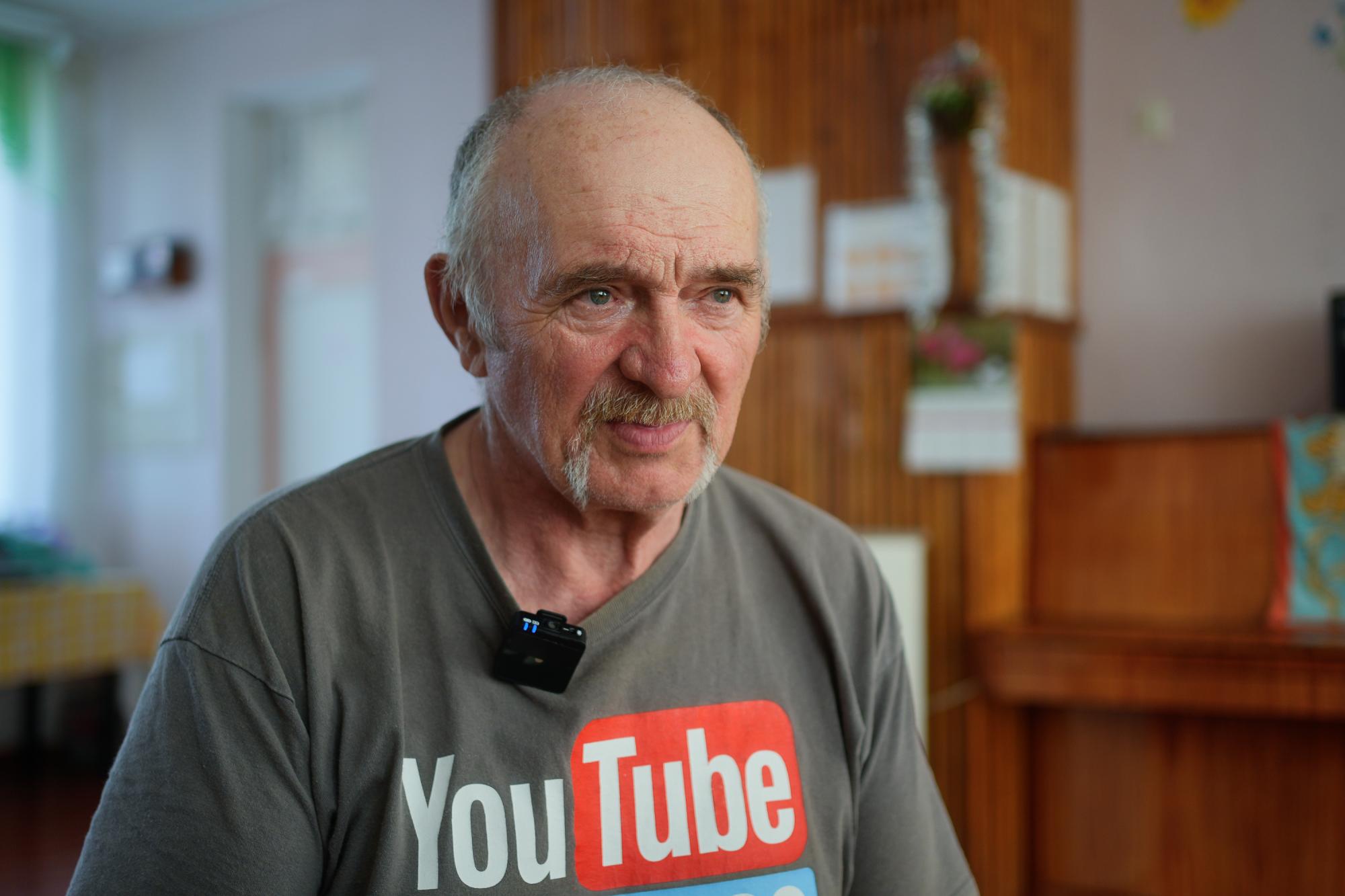 Photo: Volodymyr Sarzhevskyi from Soledar (RBC-Ukraine/Dmytro Semeniuk)
Photo: Volodymyr Sarzhevskyi from Soledar (RBC-Ukraine/Dmytro Semeniuk)
He says he has no plans for the future. But he will not be able to return home.
"I think there will be nothing to do there for another 10 years. I watched a video - there are only spots of houses left, bare bricks. If we can find something old here, we will repair it. This is how we feel in our old age - we worked for 40 years at the enterprise and were left with nothing," the man complains.
He recalls that over the past two years, the shelter has seen very different people, and there was a time when the police did not have time to respond to calls when young people broke the rules in the facility.
"And now normal people have moved in, it's calmer," says Volodymyr.
'The house across the street was bombed, there were victims'
In April, Natalia Rybina came to Smila with her family from Myrnohrad, which is near Pokrovsk. She says she wanted to bring her children here and save some things.
"Our house across the street was bombed, there were victims, windows and window sills were blown out," she says.
She says that since the beginning of the full-scale Russian invasion of Ukraine, she and her 85-year-old mother have been traveling to Hungary, where they lived for a year and 5 months in a hostel in a village near the capital in good conditions. But the problem was her lack of knowledge of the language. In August 2023, she returned to her hometown because it seemed to be quiet at the time.
"But in December it started - every day it was banging and thumping. We had a nice apartment there, and a job, even though I was retired. I worked at the railway station. Now nothing works in the city - neither schools nor kindergartens," the woman says.
She says that most people do not leave because they still hold on to their jobs.
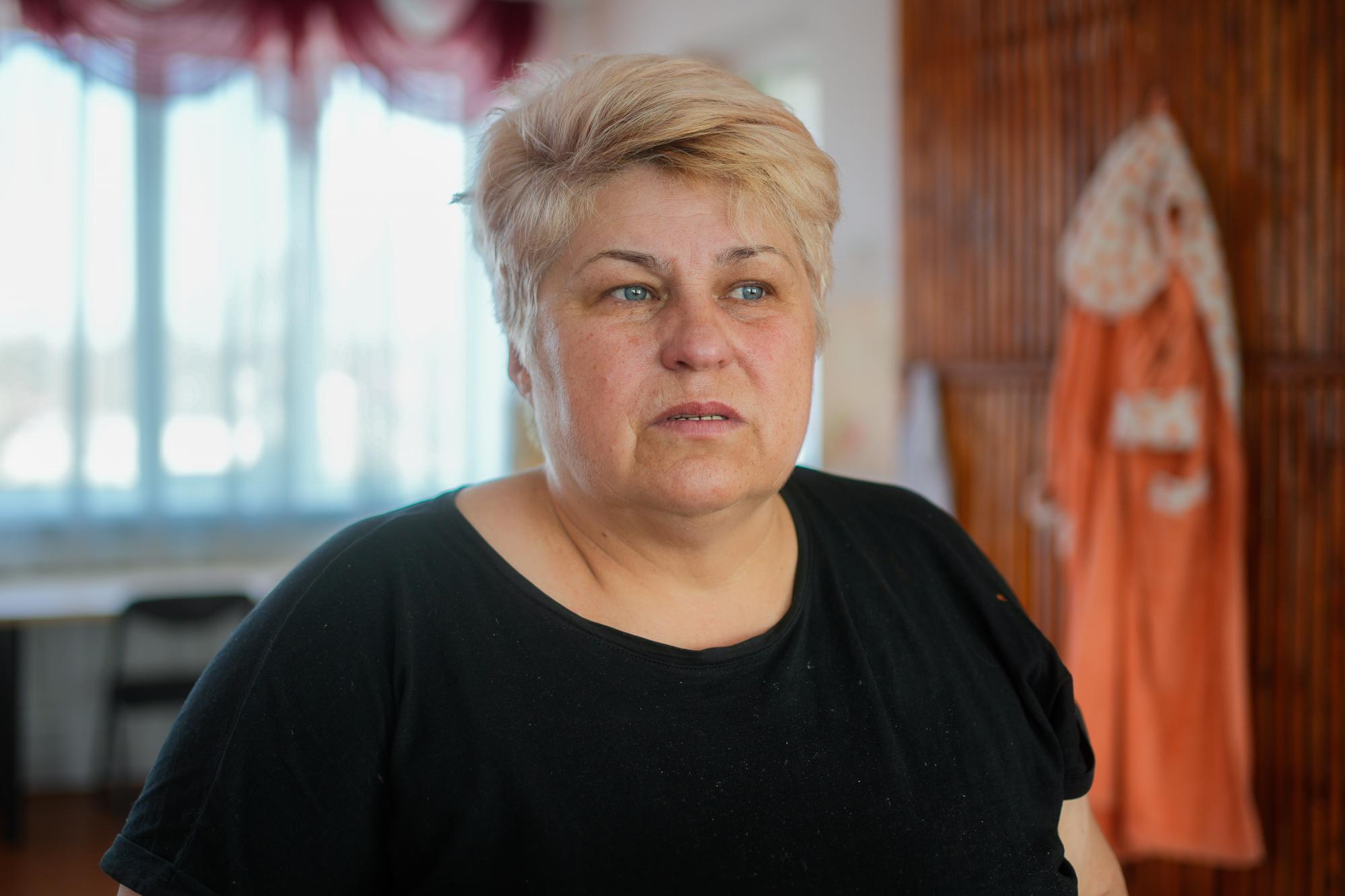 Photo: Natalia Rybina from Myrnohrad (RBC-Ukraine/Dmytro Semeniuk)
Photo: Natalia Rybina from Myrnohrad (RBC-Ukraine/Dmytro Semeniuk)
She says that she has friends in Cherkasy, so she used to come to look for housing in Cherkasy and Smila, but could not find anything affordable.
"It was purely by chance that I saw that there were places here, I was lucky. I don't want to go abroad a second time - it's better for us here, we even have people to talk to. We'll see what happens here, but for now, everything is a blur. I just came to my senses today," she says.
Main problems are living conditions and infrastructure
Over 100,000 Ukrainians who came from dangerous or frontline regions have found shelter in temporary accommodation centers. The creation of shelters made it possible to provide a roof over the heads of a large number of people in the shortest possible time, but over time, certain nuances of living in collective centers become noticeable, the Right to Protection Charitable Foundation draws attention to.
"These are both domestic issues - the need to repair rooms and bathrooms, lack of ramps, handrails, insufficient appliances, furniture, and more significant issues - lack of infrastructure, transport links, and, accordingly, the inability to get to work, medical or educational institutions, and receive social services. These problems make it harder for people who have been forced to move to remote communities to improve their lives," says Rostyslav Nepyipa, senior IDP monitoring specialist at the Right to Protection Charity Foundation.
The expert adds that the issues of housing and work remain important for absolutely all IDPs.
After over 2 years of full-scale war, temporary accommodation remains relevant, as it is necessary not only for vulnerable categories of the population who cannot settle on their own but also to serve as transit points for newly arrived IDPs, the Right to Protection Charity Foundation draws attention to.
Specialists of the charitable foundation constantly monitor the observance of the rights of IDPs and people affected by the hostilities and provide legal, financial, material, psychological, and social support.
According to the Ministry of Reintegration, the total number of temporary accommodation facilities is 1038. At the same time, according to the Place of Temporary Residence Management and Coordination Cluster, as of March 2024, there were 2647 temporary accommodation facilities in Ukraine.
"Such a difference in data may be because the lists include places of temporary residence that meet many minimum requirements for the livelihood of IDPs established by the government or can be brought into line with them. However, in some cases, the shelters that operate do not meet these requirements," the Right to Protection charity foundation notes.
Number of shelters to be increased
The number of internally displaced persons in Ukraine is growing, as a new wave of immigrants from Kharkiv, who have not left for two years, or those who are leaving again, has begun, says Maksym Tkachenko, head of the working group of the Temporary Special Commission of the Verkhovna Rada on housing for IDPs.
"In two years, the state has been able to accommodate only 1-2% of IDPs in temporary housing. This is very little. We set a goal to increase the number of these places of temporary residence to at least 10% of the total number of IDPs in the country. It is necessary to strengthen the information policy in this direction so that all hubs, websites, and telegram channels have information about the possibility of staying in such temporary accommodation," he says.
A small part of these shelters are private. They do not charge for accommodation because they receive compensation for utilities from the state.
Maksym Tkachenko explains that living conditions in shelters often depend on where they are located and who takes care of them.
"Where there are local authorities, donors or partners, volunteers, and NGOs nearby, the conditions are more or less good. But if a shelter, for example, is managed by the Regional Military Administrations, and it is located in the region, then, unfortunately, the conditions are often not very satisfactory, because no person would be in charge of this dormitory," the MP notes.
The dormitories with unsatisfactory conditions are not included in the official list of temporary accommodation, he adds.
"There is no clear figure on how many places of temporary residence there are that do not have an official status, but I think there are at least 100 such facilities across the country. According to the criteria, international organizations cannot help if this facility is not an official place of temporary residence," Maksym Tkachenko points out.
According to him, an inventory of all dormitories that can accommodate IDPs, including student dormitories, is currently underway.
"I hope that sometime in May we will get the final list at least from the Ministry of Education of those additional dormitories and locations for possible accommodation of IDPs," he says.
If these places of free accommodation are publicized, there will be people willing to move in, says Maksym Tkachenko. Especially after the cancellation of payments for many IDPs and against the background of rising rental costs.
